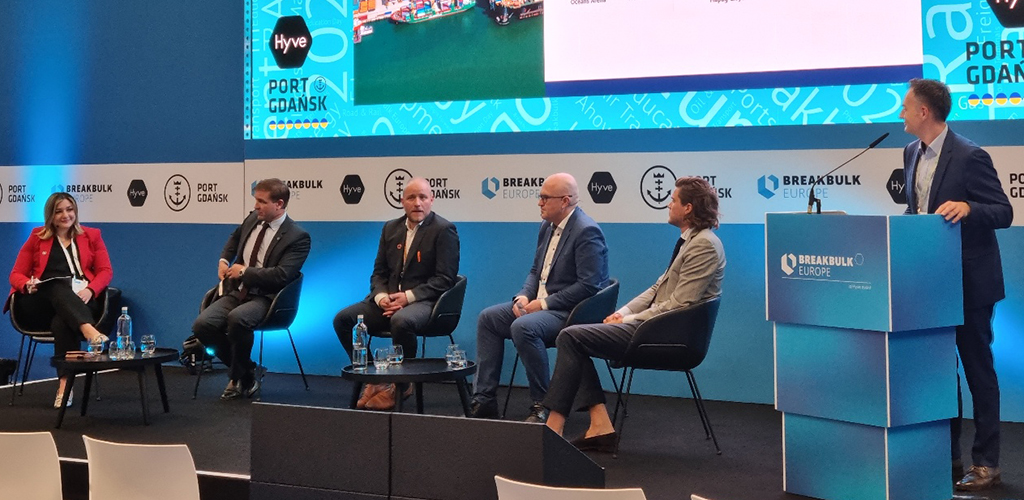Carriers ‘All in the Same Boat’ in Meeting Environmental Regulations

By Carly Fields
SAME-DAY BREAKBULK EUROPE COVERAGE: The environmental agenda in breakbulk and project cargo shipping cannot be achieved without productivity, innovation, constant constructive dialogue, carbon pricing, trust and reliability.
Those factors combined will support the industry in its decarbonisation, according to a Environmentalism and Future Fuels within Breakbulk panel discussion at Breakbulk Europe 2022.
Roger Strevens, vice president of sustainability at Wallenius Wilhelmsen, said that no company can be “complacent and successful” in driving change, while Sören Werbeck, director of specials strategy & steering at Hapag-Lloyd AG, noted “we are all in the same boat” when it comes to meeting environmental regulations.
The panel discussed a range of fuels, including biofuels and electrofuels, concluding that there is no one-size-fits-all approach. Strevens said it is hard to nail colors to the mast with one fuel in the deep-sea trades.
Werbeck reminded the audience that the life cycle of production needs to be included in considerations of which fuel to use and that there are still efficiency gains to be made. Bernard Van Haeringen, commercial manager of marine at GoodFuels, added that life cycle consideration is needed to be sure that a fair assessment can be made.
Reducing the number of voyages in ballast would help, added Leif Arne Strømmen, a partner at Peak Group.
Strevens noted that Wallenius Wilhelmsen’s target is to have all vessels full all the time. “That makes the most sense economically and also from an environmental perspective.” He added that while regulation is currently only looking at the fuel tank of the ship to the wake of the ship, full life cycle is “definitely coming.”
Strevens pointed out that the decision of which future fuel to bunker is not simply a technical one: “It’s operational in that is the fuel in the place you need it; it’s financial; then there’s a regulatory dimension; and finally, the fuel needs to be commercially viable. We need options, we can’t take anything off the table.”
Operators need to ask two key questions when considering which fuel to use. Firstly, is the fuel available and is it available where you bunker and secondly, is it more expensive than what you otherwise use. “If so, you need something to close that gap. Regulation is one option, demand is another,” Strevens said.
Van Haeringen described biofuels as a “great option” for making an impact right now. GoodFuels develops sustainable, scalable and affordable biofuels.
Strømmen said he was an advocate of carbon pricing to help support first movers and a proponent of hybrid solutions to ensure flexibility.
Regulators, meanwhile, now have a firm eye on shipping’s decarbonization, and while the International Maritime Organization has been criticized for its slow decision-making progress, the European Commission has “really set its sights on shipping,” Strevens said. “There is an impatience in Europe at the pace of developments at the IMO.”
With all the change and uncertainty surrounding fuel choices for multipurpose operators, the industry faces a “very disruptive” journey, Van Haeringen said. “The choices that shipowners need to make, and the costs are super impactful.” Added to which, everything that is cheap and easy to fix has been done, Strevens said; “What’s left is difficult, destructive and dear.”
Check out our interviews with speakers from the session:
